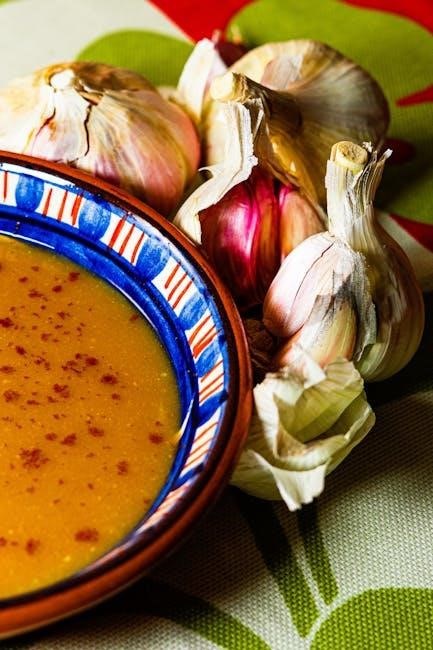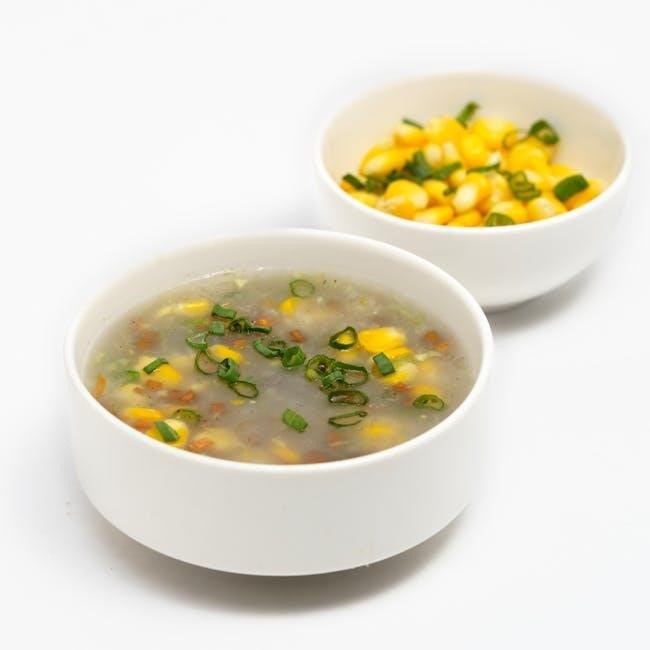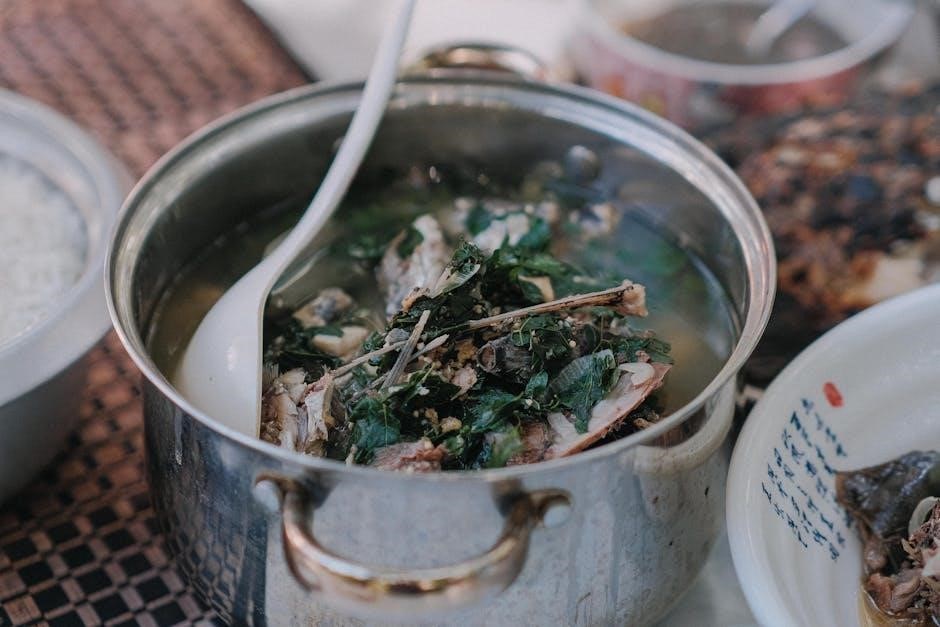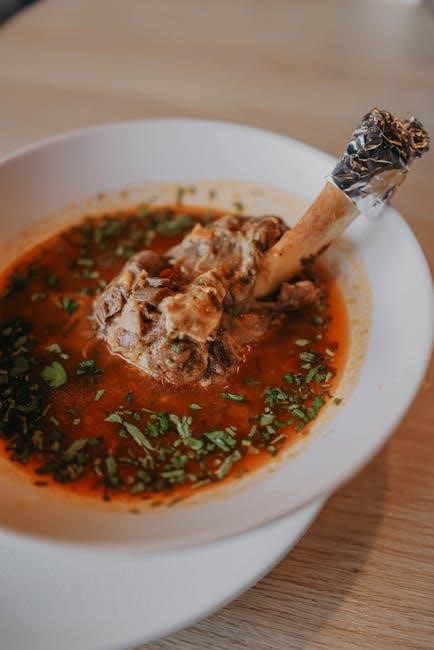The 21-Day Bone Broth Diet Plan combines a Paleo-inspired diet with intermittent fasting, focusing on bone broth as a key component for weight loss and improved health.
Overview of the Diet
The 21-Day Bone Broth Diet Plan is a structured program combining Paleo-style eating with intermittent fasting. It involves 5 days of Paleo-inspired meals and 2 days of bone broth fasting weekly. The diet emphasizes whole, unprocessed foods, avoiding grains, dairy, and inflammatory triggers. Bone broth is central, providing essential nutrients like calcium, magnesium, and collagen. This plan aims to promote weight loss, improve gut health, and reduce inflammation. It’s designed for those seeking a balanced approach to nutrition and detoxification, with a focus on sustainable, long-term health benefits.
Origins and Popularity of the Bone Broth Diet
The Bone Broth Diet was popularized by naturopathic physician Dr. Kellyann Petrucci, blending Paleo principles with intermittent fasting. Its rise began as people sought natural, holistic approaches to health. The diet gained traction for its simplicity and potential benefits, such as weight loss and improved digestion. The 21-day plan, emphasizing bone broth as a nutrient-rich staple, resonated with those seeking a sustainable, low-carb lifestyle. Its popularity stems from its unique combination of fasting and nourishing foods, appealing to health-conscious individuals worldwide.

Benefits of the 21-Day Bone Broth Diet
The 21-Day Bone Broth Diet promotes weight loss, improves gut health, reduces inflammation, and enhances overall nutrition through its nutrient-rich, low-carb approach and bone broth’s healing properties.
Weight Loss and Fat Burning
The 21-Day Bone Broth Diet is highly effective for weight loss, as it combines fasting and a low-carb, Paleo-inspired diet to burn fat. The bone broth, rich in collagen and nutrients, supports metabolism and reduces hunger. By restricting carbs and focusing on whole foods, the diet promotes ketosis, a state where the body burns fat for energy. Fasting days, fueled by bone broth, help deplete glycogen stores, shifting the body into fat-burning mode. This approach not only aids in shedding pounds but also targets stubborn belly fat for a slimmer, healthier physique.
Improved Gut Health and Reduced Inflammation
The 21-Day Bone Broth Diet enhances gut health by providing essential nutrients like collagen, which heals the gut lining, and anti-inflammatory compounds like glutamine. These nutrients reduce inflammation and improve digestion. The diet’s focus on whole, unprocessed foods avoids irritants that can cause inflammation. Regular consumption of bone broth also supports the growth of beneficial gut bacteria, promoting a balanced microbiome. This combination of anti-inflammatory effects and gut-healing properties makes the diet beneficial for those with digestive issues or chronic inflammation.
How the 21-Day Bone Broth Diet Works
The 21-Day Bone Broth Diet combines a Paleo-inspired diet with intermittent fasting, cycling between 5 days of clean eating and 2 days of bone broth fasting weekly.
Phases of the Diet: Fasting and Eating Cycles

The 21-Day Bone Broth Diet is structured into phases, alternating between eating and fasting cycles. Each week includes five days of Paleo-style meals, focusing on whole, unprocessed foods like vegetables, lean proteins, and healthy fats, while avoiding grains and dairy. The remaining two days are designated for bone broth fasting, where participants consume three to six cups of bone broth to support detoxification and fat burning. This cycle repeats for three weeks, promoting weight loss and improved metabolic health.
Role of Bone Broth in the Diet
Bone broth is the cornerstone of this diet, serving as both a fasting aid and a nutrient-rich supplement. During fasting days, it provides essential vitamins, minerals, and electrolytes, helping to curb hunger and support detoxification. On eating days, it complements meals by enhancing digestion and promoting gut health. Packed with collagen, calcium, magnesium, and phosphorus, bone broth supports bone strength and overall wellness, making it a vital component for achieving the diet’s goals of weight loss and improved health.
Comparison to Other Diets (Paleo, Intermittent Fasting)
The 21-Day Bone Broth Diet uniquely blends elements of the Paleo diet and intermittent fasting. Unlike strict Paleo, it emphasizes bone broth for fasting periods, offering a more structured approach. Compared to intermittent fasting alone, the inclusion of Paleo-style eating ensures balanced nutrition while maintaining the benefits of fasting. This combination creates a hybrid plan that supports weight loss, improves gut health, and reduces inflammation, distinguishing it from other diets by its focus on bone broth as a foundational element.
Meal Planning and Recipes
The 21-Day Bone Broth Diet includes structured meal plans, emphasizing bone broth as a central ingredient. Recipes range from soups to Paleo-inspired dishes, ensuring variety and nutrition while supporting weight loss and overall health goals.
Sample Daily Meal Plan
A typical day on the 21-Day Bone Broth Diet includes:
- Breakfast: 8 oz. of bone broth paired with grain-free oatmeal.
- Lunch: 8 oz. of bone broth alongside a jerk chicken sandwich.
- Snack: Hummus with sliced peppers.
- Dinner: 8 oz. of bone broth with chicken cacciatore and lemon garlic green beans.
This plan balances nutrients, supports weight loss, and aligns with the diet’s principles of clean eating and intermittent fasting.
Weekly Meal Plan Structure
The 21-Day Bone Broth Diet follows a weekly cycle of 5 days of Paleo-style eating and 2 days of bone broth fasting. Each week, meals are structured to include:
- Paleo Days (5 days): Balanced meals like veggie omelets, grilled chicken salads, and baked salmon with steamed vegetables.
- Fasting Days (2 days): 3-6 cups of bone broth, focusing on hydration and electrolyte balance.
This structure promotes weight loss, detoxification, and improved overall health while maintaining nutritional balance.
Tips for Sticking to the Diet
To successfully follow the 21-Day Bone Broth Diet, stay hydrated by drinking plenty of water and bone broth throughout the day. Plan meals in advance to avoid temptation and incorporate bone broth into soups or stews for variety. Track your progress with a journal to monitor weight loss and health improvements. For cravings, opt for healthy snacks like nuts or vegetables. Stay motivated by focusing on the diet’s benefits, such as improved digestion and energy levels. Consistency is key to achieving long-term results.
Shopping List and Preparation
Stock up on grass-fed bones, organic vegetables, and herbs. Store homemade broth in airtight containers for up to 5 days or freeze for later use.
Essential Foods for the Diet
The diet emphasizes grass-fed bones, organic vegetables, herbs, and Paleo-friendly proteins. Incorporate leafy greens, wild-caught fish, and pasture-raised meats. Avoid grains, dairy, and processed foods to optimize results.
Bone Broth Recipe and Storage Tips
Make bone broth by simmering grass-fed bones, vegetables, and herbs in water for 12–24 hours. Strain and let cool. Store in airtight containers in the fridge for 3–5 days or freeze for up to 6 months. For convenience, portion into ice cubes or jars. Always label and date containers for easy tracking. Proper storage ensures freshness and nutrients remain intact, supporting the diet’s effectiveness and convenience throughout the 21-day plan.
Exercise and Lifestyle Tips
Incorporate moderate exercise like yoga or brisk walking to enhance fat burning and overall health. Prioritize hydration and aim for 7–8 hours of quality sleep nightly for optimal results.
Recommended Physical Activities
Engage in moderate exercises like yoga, brisk walking, or light cycling to support weight loss and overall well-being. These activities enhance fat burning and improve mobility without excessive strain. Yoga is particularly beneficial for flexibility and balance, while brisk walking boosts cardiovascular health. Incorporate strength training twice a week to maintain muscle mass, using bodyweight exercises or light resistance. Consistency is key—aim for at least 30 minutes of physical activity most days of the week to maximize the diet’s effectiveness and promote long-term health benefits.
Importance of Hydration and Sleep
Staying hydrated is essential for digestion, energy, and overall health. Drink plenty of water and bone broth to replenish fluids and support fat burning. Additionally, prioritize 7-9 hours of quality sleep nightly to aid in metabolism regulation, appetite control, and bodily recovery. Poor sleep can hinder weight loss efforts and increase cravings, while proper hydration ensures optimal nutrient absorption and detoxification. Both hydration and sleep are critical for maximizing the diet’s benefits and maintaining long-term well-being.

Potential Challenges and Solutions
Common challenges include cravings, fatigue, and social pressures. Solutions involve meal prepping, staying hydrated, and ensuring adequate sleep. Planning and commitment are key.
Common Issues Faced During the Diet

Many participants experience hunger, fatigue, and cravings, especially during fasting days. Social challenges, like avoiding meals with others, can also be difficult. Additionally, the monotony of relying heavily on bone broth may lead to dissatisfaction. Some individuals may struggle with the restrictive nature of the Paleo diet phase, missing grains and dairy. These issues often arise due to the drastic change in eating habits, requiring strong willpower and discipline to stay on track throughout the 21-day period.
Strategies to Overcome Cravings and Fatigue
To manage cravings, incorporate nutrient-dense snacks like veggies or nuts during non-fasting days. Staying hydrated with bone broth can reduce hunger pangs. Fatigue can be mitigated by ensuring adequate sleep, prioritizing protein-rich meals, and engaging in light exercise. Mindful eating and planning meals in advance also help maintain discipline. Herbal teas and small portions of healthy fats, such as avocado, can further curb cravings and provide energy, making the diet more sustainable over 21 days.

Maintenance and Long-Term Results
Maintaining weight loss involves continuing bone broth intake, healthy eating habits, and regular physical activity. Incorporate meal prepping and hydration to sustain long-term health benefits effectively.
Post-Diet Meal Planning
After completing the 21-day bone broth diet, focus on maintaining healthy habits by incorporating bone broth into your meals. Gradually reintroduce whole, nutrient-dense foods like lean proteins, vegetables, and healthy fats. Avoid processed foods and sugars to sustain weight loss and gut health. Consider intermittent fasting to continue fat burning. Stay hydrated and listen to your body’s needs. Plan balanced meals, including bone broth-based soups or stews, to support long-term wellness. Personalized meal plans can help tailor your diet for sustained results and overall health benefits.
Sustaining Weight Loss and Health Benefits
To maintain weight loss and health benefits after the 21-day bone broth diet, continue incorporating bone broth into your meals for its nutrient-rich properties. Focus on whole, unprocessed foods and avoid sugary or inflammatory ingredients. Stay hydrated, prioritize quality sleep, and consider intermittent fasting to support fat burning. Regular physical activity and mindful eating habits will help sustain results. Monitor your progress and adjust your diet as needed to ensure long-term success and overall wellness.

